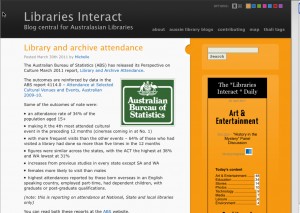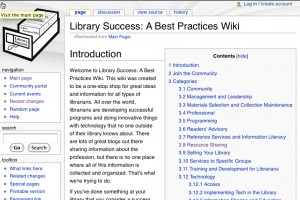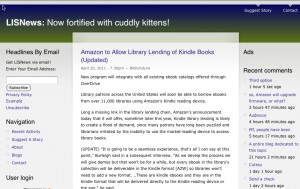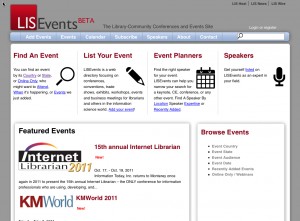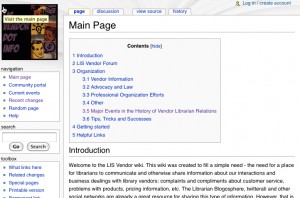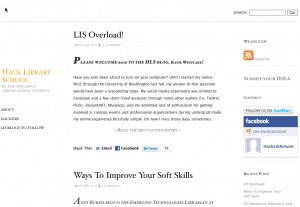… authors I hope…but we need to make it so…
File this one under “trends to watch out for” – or probably “trends that will steamroller us if we have not understood their effects by now”. We should be watching musicians for clues about how the change from physical to online,electronic, pirateable content affects an industry. What they are doing now may happen for authors within two years.
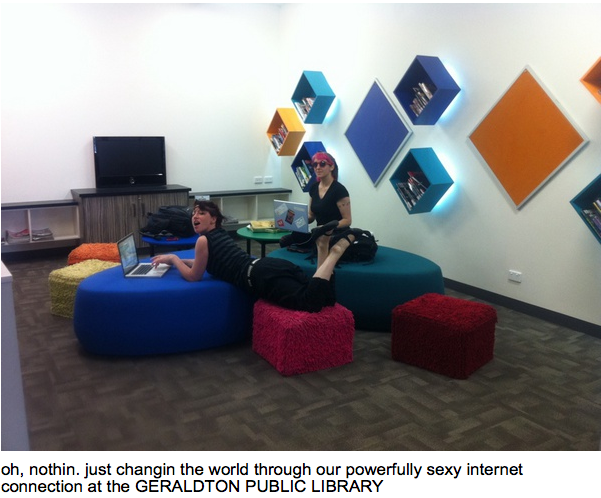
Amanda Palmer with Kim Boekbinder at the Geraldton Public Library today
In my post in an unfinished (I know!) series, 11 answers for libraries in 2011: PART ONE I suggested that libraries should consider working together “to create a single publishing platform and rights-management tool to allow easy creation and access to local content”. I think that we should add to my fantasy platform an “easy direct payment system to authors”. This could mean providing an easy way for authors to receive payment in return for content from their readers, or a way for libraries to jointly subsidize production of works.
Libraries are used to paying for content. If the average academic library user understood the subscription costs to academic databases or scholarly articles, their heads would spin – we are talking sometimes tens of thousands for a single specialist database. We budget to pay for content. We want to give money to someone for content.
If in some cases we were to cut out publishers as middle men, as suggested by Michael Mace in his keynote at the ALIA Information Online Conference last week, it would mean dealing directly with authors. If so, we need to make it an OK thing for authors to ask libraries for money. I wonder if the “halo effect” of libraries being such a great, beneficial institution actually stops authors from considering direct payment from libraries a possibility. Maybe we need to be more vocal about our budgets and willingness to pay.
After attending four performances by punk-cabaret idol, Amanda Palmer, in the last couple of weeks, I can see that libraries could position themselves in two new ways in a future where technology allows authors to better control their content distribution. One way would be as hosts for “ninja distribution” – free, limited access events. The other would be to directly subsidize content to ensure authors could eat while they create. More on this after looking at how Amanda Palmer is challenging music industry production.

Alice. (2011). AFP and Kim. Retrieved from http://www.flickr.com/photos/six_impossible_things/5421235865/ (Ninja Gig outside Art Gallery of W.A. on Saturday. That's me behind the blue camera 🙂 )
After a successful career with the Dresden Dolls, and some time solo with her material released under a record label, Amanda Palmer is now much more in control of her own distribution. Yes, she still plays large promoter-driven shows such as the one at the Sydney Opera House on Australia Day. She also uses online tools such as “bandcamp” to allow fans to purchase music at the price *they* choose to pay, often with a minimum of 99c or somesuch ridiculous price… although you can also buy her material for much more through iTunes. See for example her bandcamp download of the album of Radiohead covers played on the ukulele .
During her Australian tour, she offered to play in a private concert for up to 50 people for a flat fee of $5000. This totally cut out the middlemen. Her reflection on the experience, though, reflects an unease that I think libraries will need to face if we want to deal directly with content creators.
i was actually kind of nervous about the gig[…] about whether we would all feel weird about a situation in which people had paid serious money – pretty much directly – to attend a […] weird suburban picnic with a crazed piano player.
strange, i don’t feel weird or think twice about 2,000 people paying $80 to see me at the opera house, where i don’t handle the money.
but this was different – i was wondering if i’d feel strange, guilty, whatever. i didn’t. ‘
well, actually that’s a lie. when i first walked into the house and i saw all the food karina’s mother had cooked {…] i thought: i’m getting paid? for this?
why don’t i think that when i see catering? or when people bring me food backstage, like they often do, sometimes at great expense to themselves? i dunno.
i think there’s something inherently difficult about saying: THIS IS WHAT I COST IF YOU WANT ME directly to your fans.
it’s easier to say it to a promotor, to a venue. i say it all the time. it’s harder to say it to your friends and fans.
Over at the Techdirt blog, their is a nice little post that looks further at Amanda Palmer’s model and the place of middlemen, The Awkwardness Of Cutting Out The Middleman. They suggest that there is a place for middlemen, but if they are “obscuring the transaction” rather than adding value then maybe the audience would be more likely to give more money directly to the content creator. There then, is the quandry for libraries – if we are going to continue to be “middle men” between authors and readers, how do we ensure that we are adding value, not obscuring the transaction? See also the comments at the end of the post for opinions about middlemen and the music industry.
Libraries – as they always have – can work as a mechanism for the community to pool their money to get the maximum content for their buck. To do this we must persuade the community to continue to fund us and – in a world where the middle man is being dropped altogether – persuade users and authors that they get real benefit from us buying content on our users’ behalf.
The second way libraries can support content creators is as venues for “ninja gigs”. Two of the Amanda Palmer performances I attended were organised the day before via social media , and at no cost to the attendees. Gratis. Both felt like an unconference of a gig – with the audience choosing what was performed and one event ending with Amanda crowd-surfing the mosh pit while continuing to play the uke. But – I will bet that next time Amanda Palmer is in town many of these people will now buy tickets to the paid gig. Libraries – as a central, trusted institution with staff who maintain and cultivate relationships with authors – could act as venues for author readings or for limited-time downloads of electronic versions of author works. We have a reading public that we also cultivate, educate and host that could be matched with authors.

Hall, M. (2011). Amanda Palmer. Retrieved from http://www.flickr.com/photos/pixels-bandwidth/5394059713/ (Amanda Palmer and Neil Gaiman on stage at the Sydney Opera House, Australia Day 2011)
There have been experiments with similar approaches to free content by publishers, among many examples the attempt by HarperCollins to let fans vote for one of Amanda Palmer’s husband’s books to be provided online for free. Chap is called Neil Gaiman. You may have heard of him. Problem was, the format they chose for American Gods was online-reading only with each page turn taking more time than it took to (illegally) download an entire ebook by bittorrent. Authors like science fiction author, Cory Doctorow, successfully release a free downloadable version of their books on the same day as the print edition comes out. He very articulately described exactly why he does this and how he feels about publishers and ebooks at last year’s Melbourne Writers’ Festival, Copyright vs Creativity .
I look forward to seeing how this plays out. If you want to hear directly from Amanda Palmer about her alternative models of distribution and her motivations, check out the interview from 28 January 2011 with David Weinberger from the Berkman Centre for Internet and Society at Harvard, Radio Berkman 173: The Portrait of the Self-Published Artist (Rethinking Music II) . Or if you are lucky enough to attend Webstock in New Zealand on Thursday 17 February you could check out her session about what she is doing and how she is using social media to do it.

